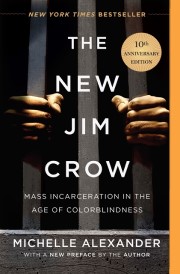|
Home
|
Aug 10, 2020
This week’s themeCharacters related to slavery who have become words in the English language This week’s words Jim Crow Simon Legree Uncle Tom topsy Aunt Tom 
The New Jim Crow: Mass Incarceration in the Age of Colorblindness by Michelle Alexander Previous week’s theme Words derived from body parts A.Word.A.Day
with Anu GargIn 1991, when I came to America to study computer science in graduate school, I shared an apartment in Cleveland, Ohio, in an area known as Little Italy. This neighborhood was filled with restaurants and art galleries. A couple of times a year they held art fests and closed the roads to traffic so people could walk around and enjoy. One evening as I was returning from school, I happened to be driving and discovered that Little Italy roads were closed except for the people who lived there. A police car was at the entrance to the area. I stopped, rolled down the window, and the police officer asked me for my driver’s license. I handed him the license, he confirmed that my address showed that I lived in the area, and waved me in. As he returned my license he said, “Thank you, sir.” Sir? I was basically a kid and here this police officer was talking to me with such respect. I was impressed with American police. My illusion did not last long. Just a few months later Rodney King happened. In spring 1991, Los Angeles police beat Rodney King, a Black man, so badly that they broke many of his bones. They were tried and a year later found not guilty. If someone had beaten a dog so badly, they’d have been put behind bars for many years, but this was a Black man, so the verdict was: Not Guilty. That’s when I realized that there’s not one America. There’s a separate America for Black people. I learned that little kids in Black homes have to be given “the talk”. A talk on how to behave when stopped by police because one false move could mean death. Parents have to give the talk because Black people are stopped disproportionately. Slavery remains a horrific mark on America’s conscience, but far from atoning for it, we continue our history of injustice to Black people in other forms. If you think it’s nothing, maybe walk in a Black person’s shoes for a day. Talk with them about what their day-to-day life is like, being asked to show ID while mowing the lawn in front of their own house, having 911 called for strolling in a park, having unarmed people shot, having little kids shot. What can you do? Here are some suggestions:
Jim Crow or jim crow
PRONUNCIATION:
MEANING:
noun: The systematic practice of discriminating against Black people.
ETYMOLOGY:
From Jim Crow, the name of a Black character in a 19th-century minstrel
show. Earliest documented use: 1832.
USAGE:
“As droves of Black Americans fled the violence of Jim Crow, Canada’s
government and residents organized to refuse you entry and even deport
those fortunate enough to clear the bureaucratic obstacles.” Andray Domise; Canada’s Own Legacy of Oppression; Maclean’s (Toronto, Canada); Jul 2020. See more usage examples of Jim Crow in Vocabulary.com’s dictionary. A THOUGHT FOR TODAY:
The President is not only the leader of a party, he is the President of the
whole people. He must interpret the conscience of America. He must guide
his conduct by the idealism of our people. -Herbert Hoover, 31st US
President (10 Aug 1874-1964)
|
|
Subscriber Services
Awards | Stats | Links | Privacy Policy
Contribute | Advertise
Awards | Stats | Links | Privacy Policy
Contribute | Advertise
© 1994-2025 Wordsmith